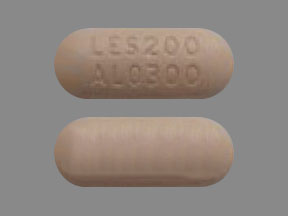Duzallo Side Effects
Generic name: allopurinol / lesinurad
Medically reviewed by Drugs.com. Last updated on Dec 20, 2024.
Note: This document provides detailed information about Duzallo.
Applies to allopurinol / lesinurad: oral tablet Side Effects associated with allopurinol / lesinurad. Some dosage forms listed on this page may not apply specifically to the brand name Duzallo.
Applies to allopurinol / lesinurad: oral tablet.
Important warnings
This medicine can cause some serious health issues
- Kidney problems like kidney failure have happened with this drug.
Tell your doctor if you have ever had kidney problems.
Serious side effects of Duzallo
WARNING/CAUTION: Even though it may be rare, some people may have very bad and sometimes deadly side effects when taking a drug. Tell your doctor or get medical help right away if you have any of the following signs or symptoms that may be related to a very bad side effect:
- Signs of an allergic reaction, like rash; hives; itching; red, swollen, blistered, or peeling skin with or without fever; wheezing; tightness in the chest or throat; trouble breathing, swallowing, or talking; unusual hoarseness; or swelling of the mouth, face, lips, tongue, or throat.
- Signs of liver problems like dark urine, feeling tired, not hungry, upset stomach or stomach pain, light-colored stools, throwing up, or yellow skin or eyes.
- Signs of kidney problems like unable to pass urine, change in how much urine is passed, blood in the urine, or a big weight gain.
- Upset stomach or throwing up.
- Lower back or side pain.
- Pain when passing urine.
- Swollen gland.
- Joint pain.
- Seizures.
- A very bad skin reaction (Stevens-Johnson syndrome/toxic epidermal necrolysis) may happen. It can cause very bad health problems that may not go away, and sometimes death. Get medical help right away if you have signs like red, swollen, blistered, or peeling skin (with or without fever); red or irritated eyes; or sores in your mouth, throat, nose, or eyes.
Other side effects of Duzallo
All drugs may cause side effects. However, many people have no side effects or only have minor side effects. Call your doctor or get medical help if any of these side effects or any other side effects bother you or do not go away:
- Headache.
- Flu-like signs.
- Heartburn.
- Diarrhea.
- Upset stomach.
- Feeling sleepy.
These are not all of the side effects that may occur. If you have questions about side effects, call your doctor. Call your doctor for medical advice about side effects.
You may report side effects to the FDA at 1-800-332-1088. You may also report side effects at https://www.fda.gov/medwatch.
See also:
For healthcare professionals
Applies to allopurinol / lesinurad: oral tablet.
General adverse events
The most commonly reported side effects included increased blood/serum creatinine, influenza, and headache.[Ref]
Renal
- Very common (10% or more): Blood creatinine increased (up to 11.4%), serum creatinine elevation 1.5 to less than 2 times baseline (up to 11%)
- Common (1% to 10%): nephrolithiasis, renal failure, serum creatinine elevation greater than or equal to 2 times baseline
- Frequency not reported: Acute prerenal/renal failure, acute uric acid nephropathy, chronic renal failure, renal events, renal impairment
Allopurinol:
- Postmarketing reports: Azotemia, nephritis, renal failure
Lesinurad:
- Frequency not reported: Kidney stones, renal-related adverse reactions, transient serum creatinine increases[Ref]
Renal failure and blood creatinine increased more commonly occurred in patients with reduced kidney function (e.g., CrCl 30 to 60 mL/min).[Ref]
Nervous system
- Common (1% to 10%): Headache
- Frequency not reported: Drowsiness, non-fatal stroke
Allopurinol:
- Postmarketing reports: Ageusia/taste loss, amnesia, dizziness, headache, neuritis, paresthesia, peripheral neuropathy, peroneal nerve palsy, somnolence, vertigo[Ref]
Gastrointestinal
- Common (1% to 10%): Gastroesophageal reflux disease
Allopurinol:
- Postmarketing reports: Abdominal pain, dyspepsia, gastritis, gastrointestinal hemorrhage, hemorrhagic pancreatitis, salivary gland enlargement, stomatitis, tongue edema, vomiting[Ref]
Immunologic
- Common (1% to 10%): Influenza[Ref]
Cardiovascular
- Frequency not reported: Cardiovascular death, cardiovascular events/major adverse cardiovascular events (MACE), non-fatal myocardial infarction
Allopurinol:
- Postmarketing reports: Bradycardia, necrotizing vasculitis, pericarditis, peripheral vascular disorder, thrombophlebitis, vasculitis, vasodilation
Lesinurad:
- Frequency not reported: Cardiovascular death, MACE, non-fatal myocardial infarction[Ref]
There were 1.85 major adverse cardiovascular events (MACE) per 100 patient-years of exposure for the combination drug, while there were 0.61 events for lesinurad and 0.6 events for placebo.[Ref]
Dermatologic
- Frequency not reported: Skin rash
Allopurinol:
- Postmarketing reports: Alopecia, bullous dermatitis, ecchymosis, eczema, erythema multiforme, exfoliative dermatitis, face edema, furuncle, hyperhidrosis, leukocytoclastic vasculitis, lichen planus, onycholysis, pruritus, skin edema, Stevens-Johnson syndrome, toxic epidermal necrolysis, urticaria[Ref]
Hematologic
- Frequency not reported: Bone marrow depression
Allopurinol:
- Postmarketing reports: Agranulocytosis, anemia, aplastic anemia, eosinophilia, hemolytic anemia, leukocytosis, leukopenia, lymphadenopathy, lymphocytosis, pancytopenia, prothrombin level decreased, purpura, reticulocytosis, thrombocytopenia[Ref]
Hypersensitivity
- Frequency not reported: Hypersensitivity[Ref]
Ocular
Allopurinol:
- Postmarketing reports: Amblyopia, cataract, conjunctivitis, iritis, optic neuritis, retinitis[Ref]
Psychiatric
Allopurinol:
- Postmarketing reports: Confusional state, depression, insomnia, libido decreased[Ref]
Other
Allopurinol:
- Postmarketing reports: Asthenia, malaise, pyrexia, tinnitus[Ref]
Genitourinary
Allopurinol:
- Postmarketing reports: Albuminuria, erectile dysfunction, hematuria, infertility male[Ref]
Metabolic
Allopurinol:
- Postmarketing reports: Decreased appetite, hypercalcemia, hyperlipidemia[Ref]
Respiratory
Allopurinol:
- Postmarketing reports: Asthma, bronchospasm, epistaxis, pharyngitis, rhinitis[Ref]
Musculoskeletal
Allopurinol:
- Postmarketing reports: Arthralgia, myalgia[Ref]
Endocrine
Allopurinol:
- Postmarketing reports: Gynecomastia[Ref]
Hepatic
- Frequency not reported: Hepatotoxicity
Allopurinol:
- Postmarketing reports: Cholestatic jaundice, granulomatous hepatitis, hepatic necrosis, hepatitis, hepatomegaly, hyperbilirubinemia[Ref]
References
1. (2017) "Product Information. Duzallo (allopurinol-lesinurad)." Ironwood Pharmaceuticals, Inc
Frequently asked questions
More about Duzallo (allopurinol / lesinurad)
- Check interactions
- Compare alternatives
- Drug images
- Dosage information
- During pregnancy
- FDA approval history
- Drug class: antihyperuricemic agents
Patient resources
Professional resources
Related treatment guides
Further information
Duzallo side effects can vary depending on the individual. Always consult your healthcare provider to ensure the information displayed on this page applies to your personal circumstances.
Note: Medication side effects may be underreported. If you are experiencing side effects that are not listed, submit a report to the FDA by following this guide.

